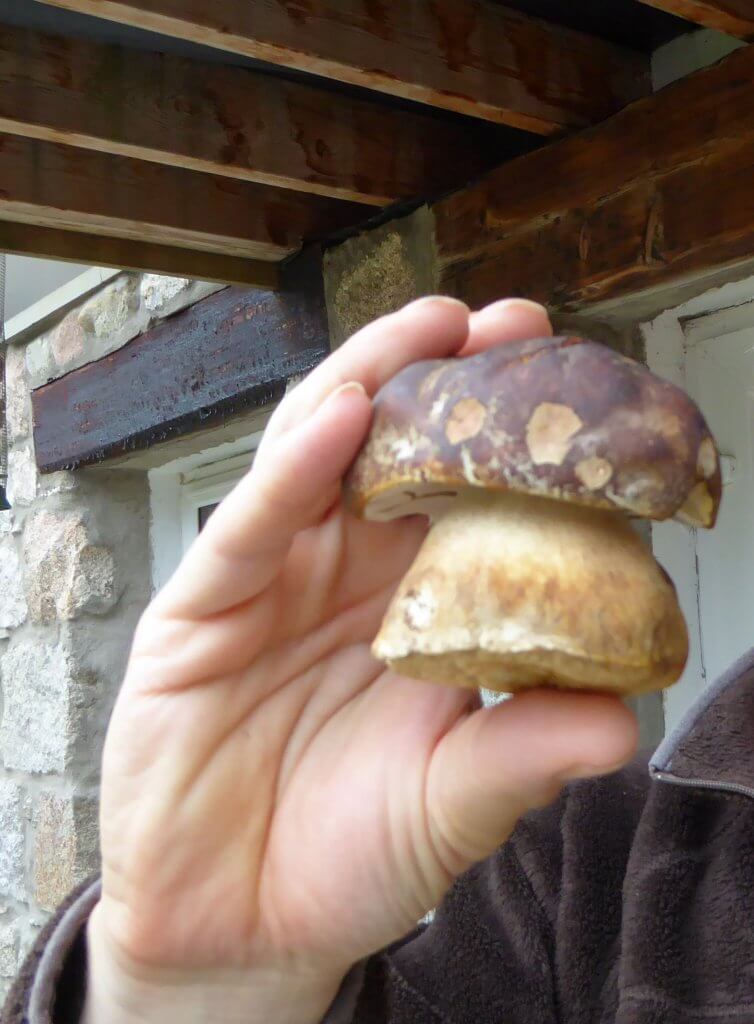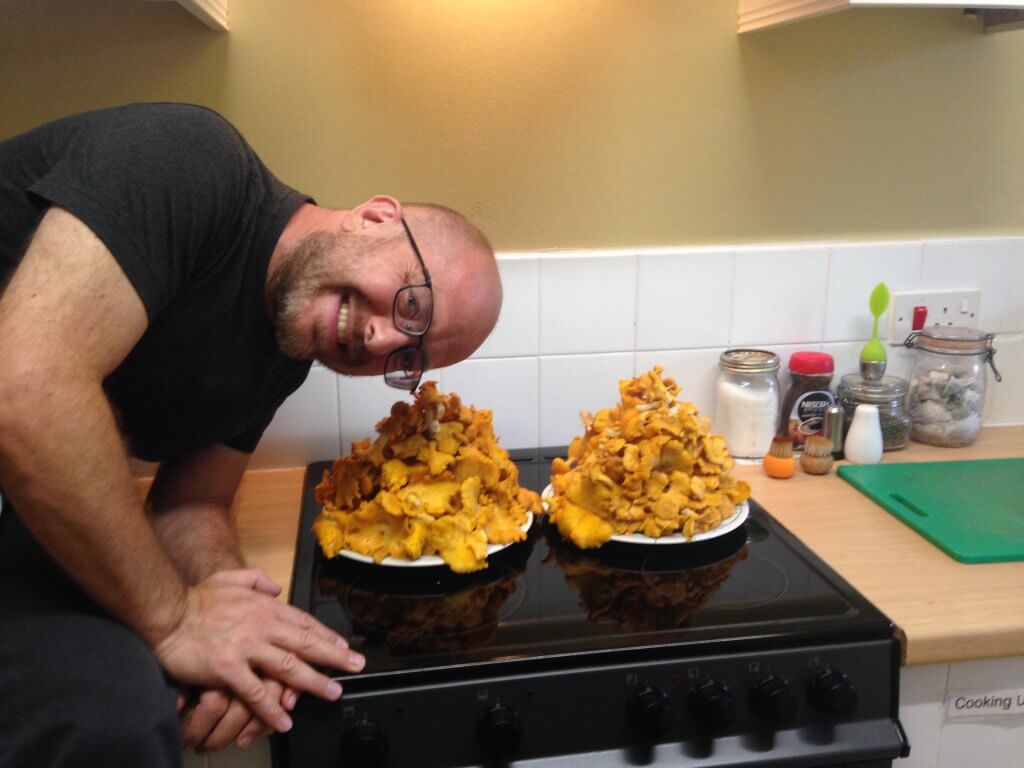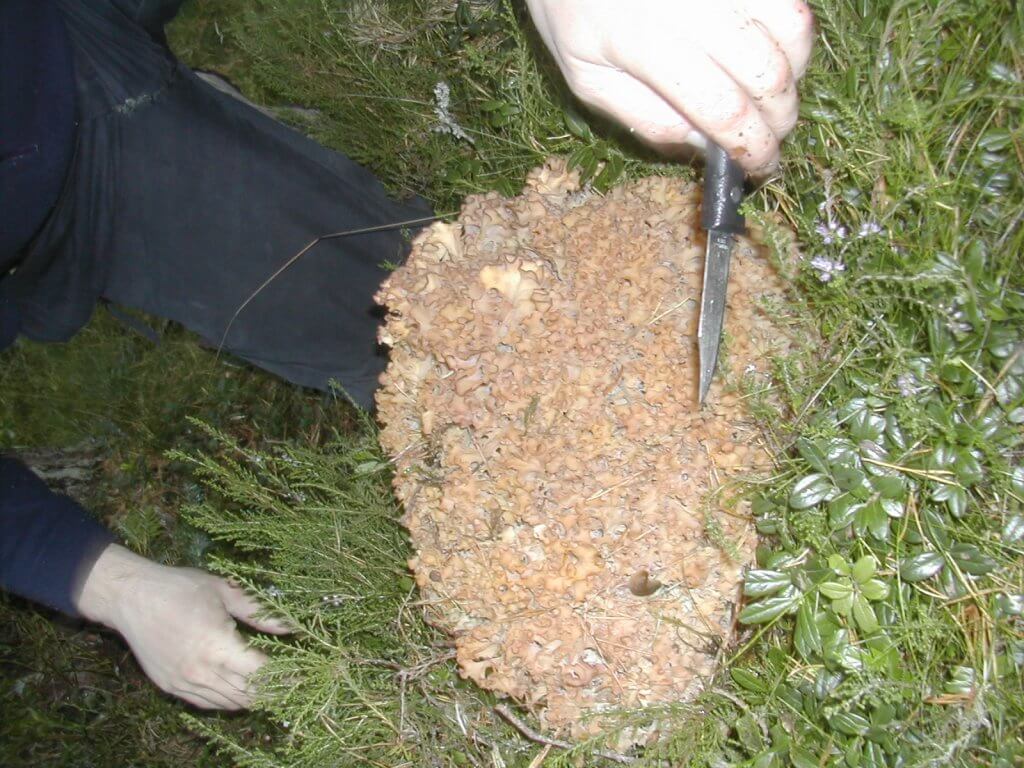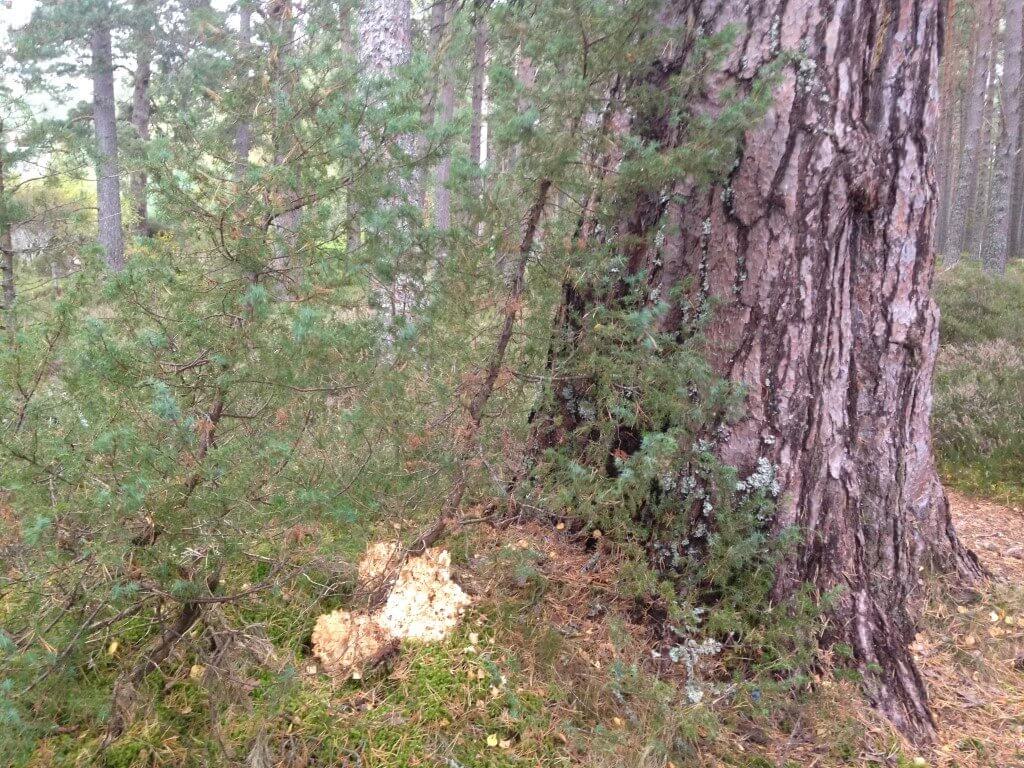2019 has been a spectacular season for foraging in the Cairngorms. Scotland’s wild larder should be renowned across the world. Whether you’re by the sea or up in the mountains, foraging in Scotland is bountiful. Our European guests are so jealous. In many parts of Europe mushroom sites are closely guarded secrets and foragers have to be out early to be in with a chance of finding anything.
It’s been unavoidable to see/pick mushrooms and we’ve also been quite lucky with berries etc. The crows are feasting on rowan berries at the moment, which I don’t mind if they leave the strawberries, bilberries and raspberries for us. One of the few benefits of a damp, showery autumn and a coolish summer with bursts of warmth, has been the proliferation of ceps, chanterelles and all kinds of fungi throughout the woods for weeks.
Foraging is a fantastic activity to introduce to your kids – but always make sure you know what you’re doing. An introductory course from a knowledgeable guide is a great way to do this.
This year (2019) has been such a spectacular mushroom season that our larder is over-loaded with dried ceps and boletus. At one point it was impossible to take a walk in the woods, without coming back with several mushrooms. Do be careful though in season to make sure you have knife with you. It is frowned upon not to use a knife to remove the boletus mushrooms when you find them.
Check the mushroom code and make sure you know what you’re doing before you head out on a fungal foray.

Scottish Wildlife Trust – details on how to identify and where to find the Cep
Further details and intro to “Fascinated by Fungi”
These are the most reliable crop of mushrooms in the Cairngorms. We manage to pick some every season and they’re usually up earlier than anything else. A great crop for summer usually up in July and August.
They freeze well and make great soup with some cream and onion. We tend not to dry chanterelle mushrooms. Freezing does make them a wee bit more watery but they are still good in soup and risotto. They maintain their texture well in the freezer.
NB There is a false chanterelle which you also find here in the Cairngorms but there are distinct differences between the 2. If you know what you’re looking for, it’s easy to be sure that you’re picking the right one. We have had guests bring back a whole crop of false chanterelles though, so maybe it’s not obvious to everyone.

This is one of our absolute favourites. There’s always too much to eat in one go and it dries a treat. The taste is relatively mild but it has an amazing firm texture completely unlike any commercial mushroom. It is great in mushroom soup, risotto, mushroom pie, venison or beef casserole in fact it is a substantial mushroom which can be cooked in virtually any mushroom recipe, including risotto.
These fungi only appear one at a time. You’ll never find a cluster as you can do with virtually all other fungi we’ve learnt to identify. They are so large it must take all the plant’s energy to produce one.
We don’t come across a cauliflower fungus every year, despite checking the site where it was previously found. It’s such a huge investment by the plant to produce such a large “fruit” that it needs perfect conditions to put one up.
The only down side is that the cleaning can be a bit of a faff – but at least you can wash it as it doesn’t absorb much water, but it helps to shake it upside down before you take it home to minimise the bugs.


We don’t find this one as often as we’d like. It’s a great firm edible mushroom.
Further details and help with identification
If you’d like to gain more confidence in your mushroom identification, enquire with us for a foraging day. There are many other foraging options which go alongside the mushrooms including a plethora of wild berries.
For me, the arrival of the false Morel is the first notable event in the fungal calendar. This is one fungi which can easily be overlooked. It might seem odd to include the fungi kingdom in a scottish wildlife feature but the fungi in the woodlands are a vital part of the ecosystem. Here in the Cairngorms they can’t be ignored.
At a glance the False Morel might appear as some nasty dog mess at the side of the hiking trail. However, with further investigation they are an interesting mushroom. Usually appearing sometime in April they often occur in pine woods, on sandy soil. Much of the Cairngorms National park is covered in woodland on sandy soil so they can be quite a common sight. Unlike other edible Morels with their honeycomb structure, the False Morel has a highly convoluted cap. This can vary from yellow brown to dark reddish brown with its stalk being an off white colour.
The False Morel has been described as the “puffer fish” of the fungal world and one most definitely to avoid, that is, unless you’re very brave. This is why. Gyromitrin, a chemical in the fungi, reacts with the stomach acid to form mono methyl-hydrazine, other wise known as rocket fuel! The symptoms of poisoning follow the same protracted path as those of ingesting the Death Cap, the most toxic of all fungi. The first stage is a 6 to 12 hour latent period. This is followed by up to 6 days of unpleasant “gastrointestinal disturbances” which can also be accompanied by seizures.
Next comes an apparent period of recovery but by this time liver damage has occurred. In serious cases this is followed by delirium, coma and possibly death. There are large variations in the way individuals react to the toxin which seem to be down to genetic makeup. Despite this, it is still regarded as a delicacy. In some European countries, especially Bulgaria, it is still collected in quantity. Repeated parboiling in fresh water is the tradition way of dealing with the toxins but this doesn’t completely do the job. Should you be preparing any quantity of them, beware of the vapours. Your kitchen could fill up with rocket fuel vapour! Not surprisingly an increased number of countries are banning its sale.
So as not to be confused, we’ve added below an example of an edible morel mushroom.
Fortunately the false morel fruits outside the main shrooming period in the Highlands. Most foragers come from July onwards. They search the woods of chanterelle and cep mushrooms. Bounty beyond belief can be found in the woods. You must always be aware of the Scottish Outdoor Access Code and pay close attention to the Scottish Wild Mushroom Code
For an introduction to safe and responsible foraging contact us for details of our Fruits of the Forest weekends (September and October).
July and August are the height of our season and this year we’ve been busier than ever, which does of course have its plus points; the down side being that we have had very little time together and time to get our heads together to plan for the autumn etc. Still we are well stocked with mushrooms (see below) and will be adding some top chanterelle mushroom recipes to the blog, just in case anyone else has been equally blessed.
Slightly less well-blessed on the weather front this year which has also meant that the fruit bushes have suffered. For the first time ever, our worcesterberries have not overwhelmed us in quantity and we probably won’t be able to restock with wine this year and will have to conserve all the fruit for jam making.
Our jam and marmelade skills have been in constant use since May as the downside to making your own jam is that people seem to eat enormous quantities of it with their breakfast.
Below if a selection of the activities and scenery we’ve been lucky enough to experience this month. We’ve saved all the wildlife and flora pictures for a seperate post. Look out for some very impressive reindeer antlers and some amazing wild flower shots to come shortly.
Always happy to hear any comments.
Nature’s bounty – chanterelles galore in the Cairngorms
Photo caption: Mushrooming in the Cairngorms – August 2015 is the month of the chanterelle; obviously a cool, wet summer does them a lot of good. So glad there are some benefits to this summer’s weather. (The photo above proved a popular Facebook post.)
Photo caption: what a lot of snow for August. Looks like it will be one of those years in which the snow will survive until the next winter season. Many more of them and we’ll see glaciers back here.
Photo caption: this might not be resort skiing but if you’re keen …
Photo caption: Hiking through the heather with Andrew Bateman of Scot Mountain Holidays to experience the hidden delights of the Cairngorms National Park. This route is part of the Complete Cairngorms itinerary.
Photo caption: Snow bridge which has developped in the Cairngorms. It makes for quite a dramatic photo.
Photo caption: dinner by candlelit is not a problem in August as we still have a fair bit a light streaming in from outside. This is our Mountains and Malts group sitting down to a revised dinner menu. Impromptu revision forced on us as we had a power cut just as our dinner was due to go in the oven. Fortunately the courgette rolls didn’t need any cooking preparation.

The Cairngorms is an amazing destination for biking. Be it road biking or mountain biking, there really is something for everyone. Not only are we surrounded by purpose built trail centres, but we also have miles of natural tracks throughout the forests and up on to the hills. There is more than enough to do for repeated visits or at least a week.
Hiking vacations:across Scotland
Mountain biking breaks: self-guided biking adventures
Family Adventures: a taste of everything for groups or families
Developing Mountain Biking in Scotland
Visit Scotland: about cycling
Visit Cairngorms: about cycling
Glenlivet Bike Trails
Laggan Bike Trails
Monster Moray bike trails
Grantown bike park
Inverness bike park
All content © Copyright Scot Mountain Holidays 2025
Responsive web design by Summit Web Solutions